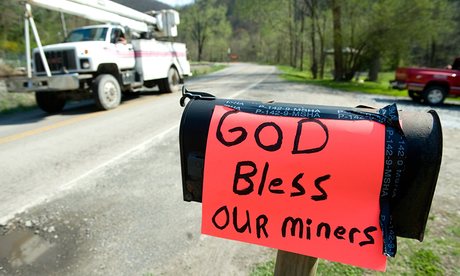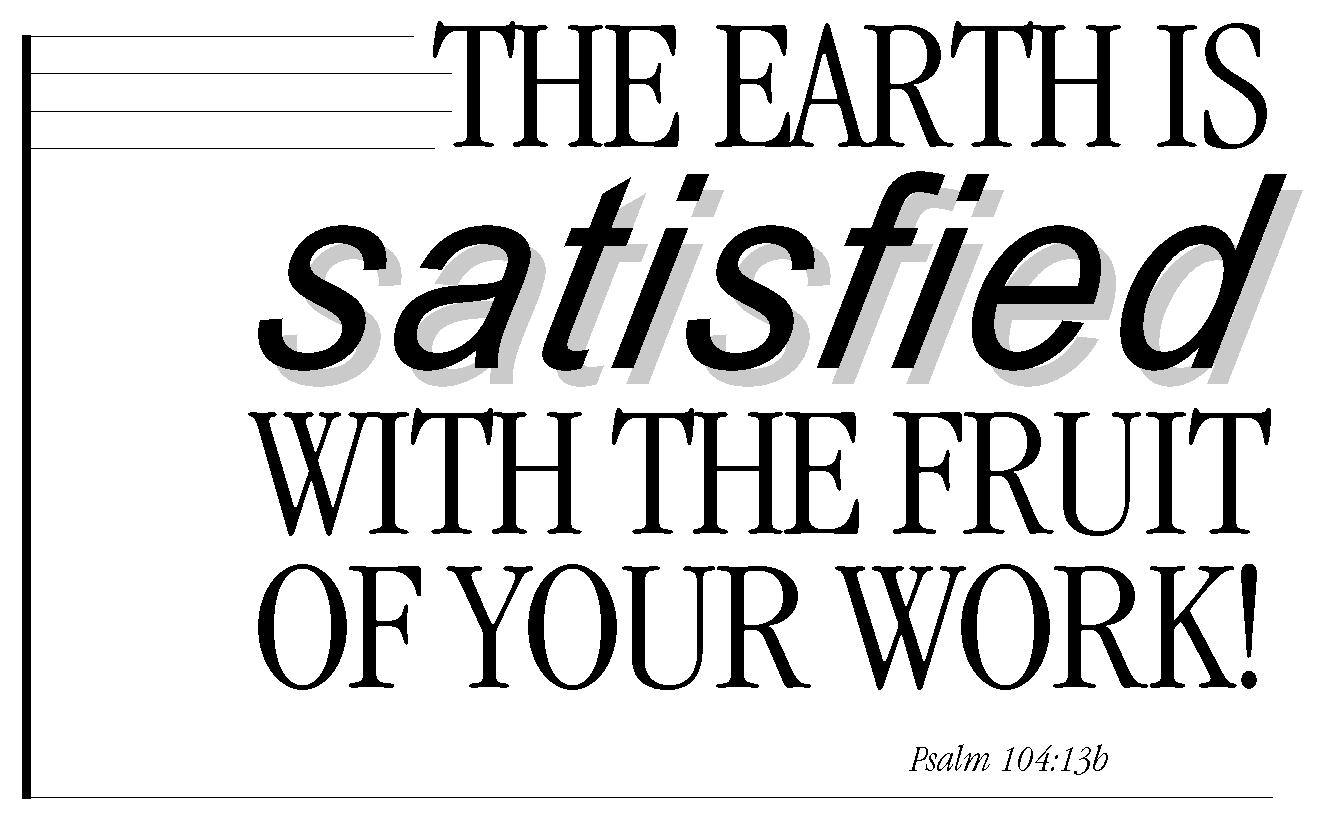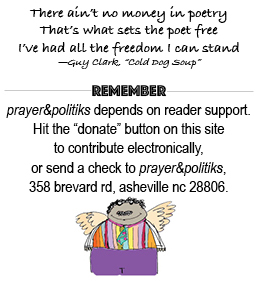by Ken Sehested
It’s daunting to sit on this stage alongside the talent assembled for this presentation. Obviously I cannot speak of women’s experiences from the inside; but I have consciously, most of my life, attempted to stay close to both the pain and the promise of women’s voices. Not as a moral gesture or generous heart, but for the sake of my own soul. In the end, this is our mandate as followers of the Way, to locate ourselves in compassion proximity to the cracks, attentive to wherever life is unraveled. In the prophetic words of Leonard Cohen, “There’s a crack in every thing. That’s how the light get in.”
Over the course of my life I’ve frequently been asked how I ended up where I am. Raised in a small West Texas town, then in South Louisiana, in traditional Southern Baptist congregations shaped by pietist-revivalist religious currents (which is very different from fundamentalism), to then evolve into a career as an outspoken advocate for justice, peace and human rights.
I don’t have a simple answer to explain that evolution, but I do recall a series of small moments when—partly from choice, partly from circumstances—I crossed inherited boundaries to be exposed to the ruptures in our social fabric.
At age 14 I had a powerful religious experience, one that continues to serve as the fount of my calling. When I talked about the experience with my pastor, he said “You’ve been call to preach.” And since the most adventurous kind of preacher in my world was the traveling evangelist, I decided that’s my direction. For a brief two years I was a traveling teenage youth evangelist. Providentially, when I went to college, accepting a football scholarship at Baylor University, our evangelistic team dissolved. And I was secretly grateful, because of the mounting suspicion of the emotionally manipulative habits I was forming.
Long story short, in my junior year I fled my religious and emotional culture for the freedom of New York University. By then my theological deconstruction was in high gear. Though I had no desire to re-embrace the church, I went to Union Seminary because the God question wouldn’t go away. That’s where I had a fresh encounter with my Baptist and Anabaptist heritage and the scriptural themes which fed it. During that period my sense of theological schizophrenia began to heal. One line from the novelist Flannery O’Connor was pivotal. Reframing a verse from John’s Gospel, O’Connor wrote “You shall know the truth, and the truth will make you odd.”
This line—affirming our oddness—is the first of ten pastoral suggestions for how we wrestle with this Convocation’s theme, “Bearing Courage: Rooted in Hope.”
2. Turbulence is the Holy Spirit’s middle name. The “perfect peace” which believers are promised is not that of serene meadows, sunny skies, and gently gurgling streams. Rather, it is sustainability given in the midst of things falling apart. It’s why Annie Dillard suggested worshipers should be given crash helmets, life preservers and signal flares. It’s why Clarence Jordan insisted that “The dove doesn't roost on a person who is scared to get hurt.”
3. God is more taken with the agony of the earth than the ecstasy of heaven. This, in fact, is the meaning of our distinctive vision of God’s atoning work. Salvation is for the world, not from it.
4. The French poet and essayist Charles Pegúy wrote, “Everything begins in mysticism and ends up in politics.” Not the politics of electoral polling we now endure (giving the pretense of democracy while largely directed by moneyed interests). Politics derives from polis, meaning the complex network of relations governing common life.
On more than one occasion I’ve told my congregation that if I had the desire and the ability to unilaterally change them, the first thing I’d do is have them bring their bodies to worship; the second, I would induce them into mysticism. Without the root source of a beatific vision—of confidently affirming with the psalmist, “I believe that I shall see the goodness of the Lord in the land of the living” (27:13)—then our work will be in vain.
5. My fifth recommendation: Don’t get worked up over the fact that sewers stink. I’m thinking here, especially, of our relationships with institutions. Yes, many institutions—ecclesial bodies included—stink to high heaven. And every institution suffers entropy, which means, in common language, every institution wants your soul. This is not news to you: don’t give in, and for goodness’ sake don’t confuse your calling with your job.
Change does not happen in general but always in particular, which means via particular institutions. An institution, however informal and short-lived or formal and long-lived, is a community with substance—as opposed to the dreamy kind we conjure up late at night around a bottle of wine. Chances are good you will need to take your leave from one or more communities in your lifetime. In my experience, it is never pleasant. (Remember what I said earlier about turbulence being the Holy Spirit’s middle name.) Get over yourself, roll up your sleeves, and get on with reweaving life’s social fabric. None of us get to heaven on our own.
6. Another warning: Don’t go autographing snowballs. Fact is, we will rarely, if ever, get the credit we “deserve” for our accomplishments, the vast majority of which are small and incremental. Remember: You can get things done, or you can get credit for getting things done. Rarely both. (A related pastoral hint: The Holy Spirit is the only one with any real copyright authority.)
7. Among the discarded practices the church most needs to reclaim is the capacity for lament—and I’m not talking about poor-talking about ourselves. I’m talking about body-wrenching, sob-inducing grief. Our capacity to grieve and lament is directly related to our capacity for hope, much like a tree’s canopy is proportionate to its root system.
8. In February 2003 I was in Iraq with a Christian Peacemaker Team, shortly before the U.S. “shock and awe” invasion. My roommate Ed actually stayed in Baghdad through the invasion, holed up in a hotel basement with 14 others. We’ve stayed in touch since then. In one note a few years ago, during another tragedy, I wrote Ed, concluding “There is agony in the air, and we must listen for the sounds of angels’ wings.” In his response, Ed said “Nor, alas, dare we ignore the flailing of devils’ tails.” Both of these disciplines are central to our discernment process of what the Spirit is saying to the church at any given moment.
9. There’s no getting right with God; there’s only getting soaked. Particularly given our culture’s economic structures and values, there is an urgency to our work as pastoral agents (and I think of every one of you as a pastoral agent, regardless of your ordination status or professional career) to clarify that the salvation proffered from God through Jesus Christ our Sovereign is not an economic transaction designed for mutual benefit for seller and buyer. The baptismal confession we made, and continue to make every time we come to the Table, is a death-defying promise. It has an all-or-nothing character. Faith, Clarence Jordan wrote, is not belief in spite of the evidence but life lived in scorn of the consequences.
10. Finally, let me close with four brief testimonies of women’s voices that have been personally significant to me in recent times.
First: One of the boldest, most innovation exegetical commentaries I’ve ever read comes from Rabbi Naamah Kelman about two of the first women’s stories in recorded history, the story of the daughter (Jewish Midrash names her Bithiah) of Egypt’s Pharaoh and Miriam, Moses’ sister. You know the story in Exodus, when Moses’ mother seeks to hide her infant son from Pharaoh’s jealous rage by putting him in a basket in the Nile. Rabbi Kelman writes,
“When Pharaoh’s daughter goes to bathe in the Nile, she hears the cries of the infant, is filled with compassion, and seizes the moment to act. Some verses later, when Moses is already grown and God reveals God’s self to Moses, God uses the same words: ‘I heard the cries of my people.’ So what we have here is not imitatio Dei. Here we have a story where God imitates us, a woman, no less, and an Egyptian daughter of a tyrant.”
Second: One of Nancy’s and my seminary teachers was German theologian Dorothee Sölle (blessed be her memory). She wrote, “We want to bathe in the blood of the dragon and drink from the blood of the Lamb at the same time. But the truth is we have to choose.” This is especially important given the fact that our country is very nearly on a permanent war footing.
Third: Hear this urgent pastoral reminder from Lydia Wylie-Kellermann, a young activist and member of the Catholic Worker House in Detroit. Writing in an issue of Geez Magazine, she said:
“Know your history. Walk it. Breathe it. Build deep relationships with the elders in your circles. Listen to their stories. Let the listening and retelling become resistance. Remember you ancestors. Say their names out loud and often. Give thanks that you are not alone. You are not creating this movement out of nothing. It’s been done over and over again. Know it. Honor it. Your work is simply to offer new gifts to old work.”
Fourth: And finally, in one short sentence Zora Neal Hurston, an African-American novelist and folklorist (and daughter of a Baptist preacher), speaks to what it means to bear courage. “I shall wrassle [sic] me up a future or die trying.” And Maya Angelou (also of blessed memory) speaks of hope: “History, despite its wrenching pain, cannot be unlived, but if faced with courage, need not be lived again.”
Sisters and brothers, heed the advice of Peter’s his first epistle, where he encourages all to be prepared to give account of the courage-rooted “hope that is within you” (3:15). But—here I’m speaking directly to you sisters—don’t obsess over doing so “with gentleness” (v. 16). Save your humility for God, as my wife’s spiritual director once told her, because well-behaved women rarely make history.
[This is the full text, which I edited for presentation to meet time constraints.]
Friday morning 8 April 2016
St. Louis, Missouri
Ken Sehested, founding director of the Baptist Peace Fellowship of North America and founding co-pastor of Circle of Mercy Congregation, Asheville, N.C., is the author and editor of prayer&politiks <prayerandpolitiks.org>, an online journal “at the intersection of spiritual formation and prophetic action.”



 subcommittee on Tuesday 12 April, during a wide-ranging discussion on the Middle East and the refugee crisis.” —
subcommittee on Tuesday 12 April, during a wide-ranging discussion on the Middle East and the refugee crisis.” — problems without using violence.” (Thanks Bruce.)
problems without using violence.” (Thanks Bruce.) exemption for churches and religious organizations.” —
exemption for churches and religious organizations.” — Resurrection joy foretell, Life in the Spirit’s breath rejoice.” —continue reading Ken Sehested’s new lyrics to “
Resurrection joy foretell, Life in the Spirit’s breath rejoice.” —continue reading Ken Sehested’s new lyrics to “ ¶ Protect and serve: When police protect us all. (0:38
¶ Protect and serve: When police protect us all. (0:38  advocates hope is a death knell for dirty energy. "Peabody Energy's bankruptcy is a harbinger of the end of the fossil fuel era," said Jenny Marienau, divestment campaign manager with the climate advocacy group 350.org. —
advocates hope is a death knell for dirty energy. "Peabody Energy's bankruptcy is a harbinger of the end of the fossil fuel era," said Jenny Marienau, divestment campaign manager with the climate advocacy group 350.org. — Robert Jeffress, pastor of First Baptist Church, Dallas, Texas, and an outspoken promoter of GOP presidential candidate Donald Trump. For more background see
Robert Jeffress, pastor of First Baptist Church, Dallas, Texas, and an outspoken promoter of GOP presidential candidate Donald Trump. For more background see  response to what is a global epidemic of violence, which Pope Francis has labeled a ‘world war in installments’, we are being called to invoke, pray over, teach and take decisive action. With our communities and organizations, we look forward to continue collaborating with the Holy See and the global Church to advance Gospel nonviolence. —read the
response to what is a global epidemic of violence, which Pope Francis has labeled a ‘world war in installments’, we are being called to invoke, pray over, teach and take decisive action. With our communities and organizations, we look forward to continue collaborating with the Holy See and the global Church to advance Gospel nonviolence. —read the 
 Earth Day resources:
Earth Day resources: ALSO featured this week on prayer&politiks:
ALSO featured this week on prayer&politiks: in Dead Horse Point Park: Rich, Jonathan, Jessica, Sydney and (behind) Nancy and Ken.
in Dead Horse Point Park: Rich, Jonathan, Jessica, Sydney and (behind) Nancy and Ken. first-ever conference on “Nonviolence and Just Peace: Contributing to the Catholic Understanding of and Commitment to Nonviolence,” co-sponsored by the Pontifical Council on Justice and Peace and Pax Christi International.
first-ever conference on “Nonviolence and Just Peace: Contributing to the Catholic Understanding of and Commitment to Nonviolence,” co-sponsored by the Pontifical Council on Justice and Peace and Pax Christi International.  the text, along with a brief response of my own. (
the text, along with a brief response of my own. ( someone liberates him or herself, but rather that people in communion liberate each other.” —Paulo Freire, Pedagogy of the Oppressed
someone liberates him or herself, but rather that people in communion liberate each other.” —Paulo Freire, Pedagogy of the Oppressed Featured this week on prayer&politiks:
Featured this week on prayer&politiks: